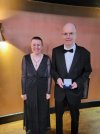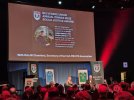How did the speech go
@Tom Kindlon?
Hope you're not too PEM'd after it.
Thanks for your interest.
We decided that Orla Ní Chomhraí, secretary of the Irish ME/CFS Association and my good friend, would give a substantial talk and I would just give a few thank yous.
The text of her speech is below.
I'm also going to shamelessly post a link
https://1drv.ms/v/c/94454629db95df81/EUPoBTpmmG9AucnxmTv8BkoBgDMnko3twhzy-NhSn3EcSg?e=utr7hs to a short video my sister took of the standing ovation for me. It's my first and most likely my last one ever!
I had access to the green room where I could rest during the event so not too bad now.
Cheers,
Tom
---
I’m delighted that Tom is receiving this award today in recognition of his work for the ME/CFS community (that stands for Myalgic Encephalomyelitis/Chronic Fatigue Syndrome). I’m just going to speak briefly about how Tom became involved in this work and the impact that his work has had.
Tom first became sick in 1989, when he was just 16. He felt sick just before a planned school trip but decided to go anyway. It was an activity-adventure based trip, involving pursuits such as canoeing, abseiling, and orienteering. Unfortunately, he was never the same after that. Anytime he tried to play sports he felt ill afterwards. He found it difficult to get his homework done.
He attended many doctors and specialists who couldn’t give him a diagnosis. He struggled on for a few years trying to exercise his way out of his symptoms, after suggestions by various physiotherapists and an orthopaedic surgeon that this might help. But, instead of helping, the exercises caused him muscle and tendon problems.
In spite of being sick, Tom managed to get a place in Trinity to study Mathematical Sciences, but he had to live a very restrictive existence in order to manage. Unfortunately, the mental exertion after a particularly strenuous exam was the last straw for him, and his illness became a lot worse.
He was finally diagnosed in 1994, at age 22; his GP who always supported him recommended he attend Professor Austin Darragh, who diagnosed ME/ CFS. Some people may remember Professor Austin Darragh from his doctor in the house segment on the Gay Byrne show.
Tom had gone, in a few years, from being someone who was actively participating in sports such as rugby, cricket, tennis and soccer, and doing very well academically, to being bedbound at his worst and needing help with basic personal care such as bed-baths. He improved a little from his very worst stage, but remained mostly housebound in the decades since then, and still lives with his parents, and relies on his family to do things for him like household chores. He had to drop out of his studies in Trinity and never managed to finish his degree.
Tom believes that the delayed diagnosis, coupled with inappropriate advice, is what led him to become as sick as he did. It is now recognised, after a study by the Centers for Disease Control in the US, that a delayed diagnosis can lead to a worse prognosis, probably because patients are unwittingly doing things that are making them worse, and it generally means dealing with a less supportive environment.
Tom's frustrating experience motivated him to become involved in the Irish ME/CFS Association. He started in 1995 and built up the group from a small base and he and his mother spear-headed an awareness campaign in Ireland that brought attention to the condition and the plight of sufferers. Since then, Tom has organised over 450 media interviews to create awareness. It was after an interview with Tom's mother, Vera, on the Gerry Ryan show that I joined and became involved in the group myself.
Tom has been the backbone of the group for years, doing a lot of work for no pay, because he is trying to improve people’s lives. This work has involved: dealing with queries from patients and their families; putting together the newsletter; sending information to doctors; dealing with media queries; organising meetings with internationally renowned medical doctors and researchers; organising fundraising for research, and encouraging people in other countries to raise money for research; and he co-authored a study on the economic impact of ME/CFS in Ireland which was published in 2020.
He has done this over a 30 year period and it involved a lot of sacrificing for Tom as he has very little available energy to do things. He only manages this through strict pacing of his activities, and he has to be a bit creative to try to get around some of his problems, such as using voice recognition on his computer to save him some of the typing, and doing a lot of work whilst lying down, as he suffers from orthostatic intolerance.
His family support has also been crucial.
Tom is not just known for his work in Ireland but has also become well known internationally in the ME world. He has authored or co-authored 26 letters and articles on ME/CFS in peer-reviewed medical and research journals, and his work can be searched on PubMed. His background in Mathematical Sciences in Trinity helped him in this analytical work, in spite of not having managed to complete his degree. Most of his publications have highlighted logical errors and poor or manipulative use of data, often to support the researchers’ preferred hypothesis.
This type of analysis may seem a bit abstract but if a causative hypothesis is incorrect, and a treatment is wrongly seen as curative, it sets back efforts to find a real cure for the condition. It can also cause harmful or wasteful treatments to be recommended. The influential Nice Guidelines, written for healthcare workers, in the UK have been much improved in the past few years, thanks to efforts of people like Tom exposing the flaws in some research.
Tom has received recognition for his work in various ways, including winning in the lifetime achievement category in the Annual Wego Health Awards (2019), receiving a Pro Health award for his "dedicated passionate work", and becoming an Honorary Fellow of Doctors with ME. I am delighted he is getting this Social Justice award tonight in recognition of his outstanding contribution to the lives of people with ME and their families. It is richly deserved.




